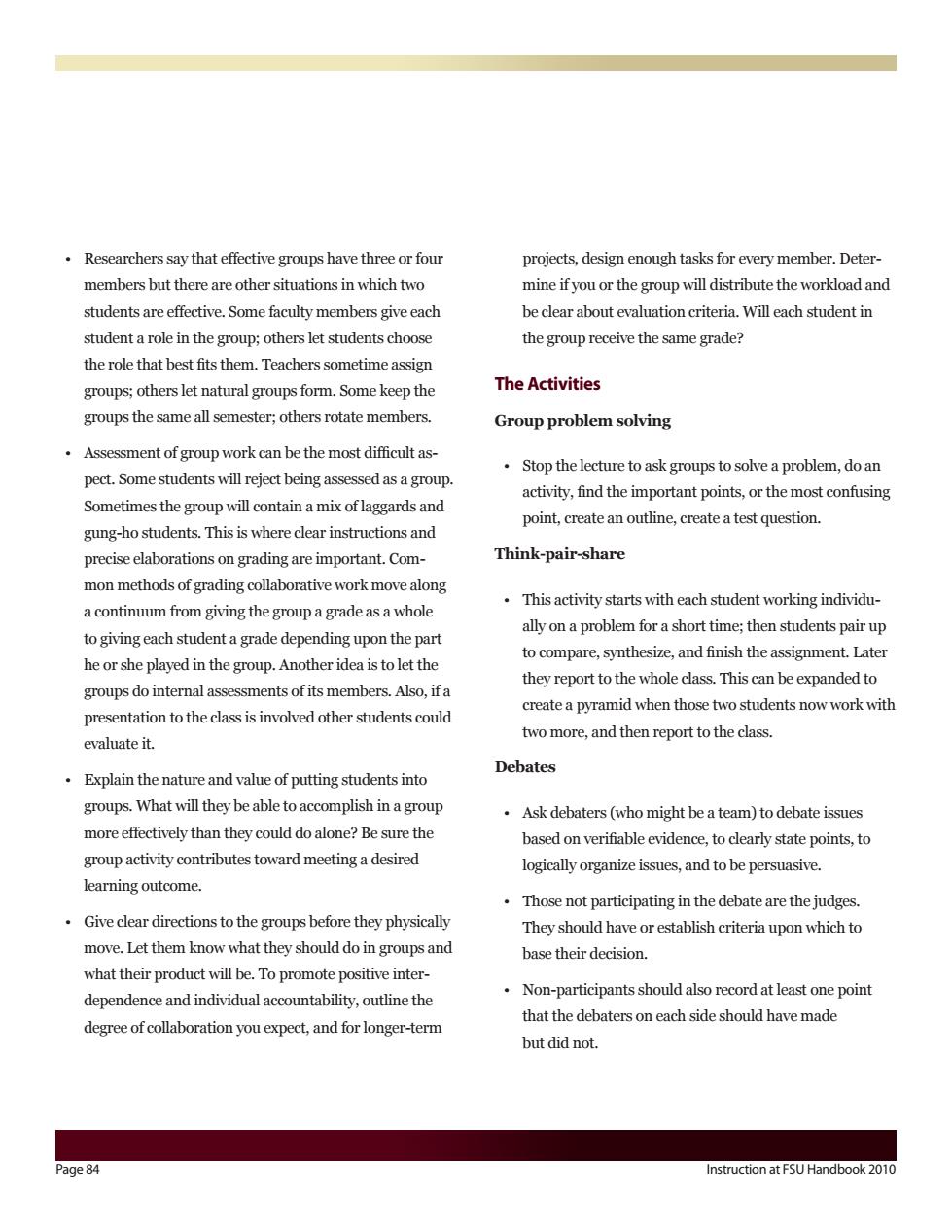正在加载图片...

Researchers say that effective groups have three or four projects,design enough tasks for every member.Deter- members but there are other situations in which two mine if you or the group will distribute the workload and students are effective.some faculty members give each be clear about evaluation criteria.will each student in student a role in the group;others let students choose the group receive the same grade? the role that best fits them.Teachers sometime assign groups;others let natural groups form.Some keep the The Activities groups the same all semester;others rotate members. Group problem solving Assessment of group work can be the most difficult as Stop the lecture to ask groups to solve a problem,doan pect.Some students will reject being assessed as a group. activity,find the important points,or the most confusing Sometimes the group will contain a mix of laggards and point,create an outline,create atest question gung-ho students.This is where clear instructions and are important.Com Think-pair-share mon methods of grading collaborative work move along a continuum from giving the group a grade as a whole This activity starts with each student working individu to giving each student a grade depending upon the part ally on a problem for a short time;then students pair up he or she played in the group.Another idea is to let the to compare,synthesie,and finish the assignment.Later groups do internal assessments of its members.Also,if a they report to the whole class.This can be expanded to presentation to theclass is involved other students could create a pyramid when those two students now work with two more,and then report to the class. evaluate it. Explain the nature and value of putting students into Debates groups.What will they be able to accomplish in a group Ask debaters(who might be a team)to debate issues more effectively than they could do alone?Be sure the based on verifiable evidence,to clearly state points,to group activity contributes toward meeting a desired logically organize issues,and to be persuasive. learning outcome. Those not participating in the debate are the judges .Giveclear directions to the groups before they physically They should have or establish criteria upon which to move.Let them know what they should do in groups and base their decision. what their product will be.To promote positive inter- dependence and individual accountability,outline the Non-participants should also record at least one point that the debaters on each side should have made degree of collaboration you expect,and for longer-term but did not. age 84 Instruction at FSU Handbook 2010Page 84 Instruction at FSU Handbook 2010 • Researchers say that effective groups have three or four members but there are other situations in which two students are effective. Some faculty members give each student a role in the group; others let students choose the role that best fits them. Teachers sometime assign groups; others let natural groups form. Some keep the groups the same all semester; others rotate members. • Assessment of group work can be the most difficult aspect. Some students will reject being assessed as a group. Sometimes the group will contain a mix of laggards and gung-ho students. This is where clear instructions and precise elaborations on grading are important. Common methods of grading collaborative work move along a continuum from giving the group a grade as a whole to giving each student a grade depending upon the part he or she played in the group. Another idea is to let the groups do internal assessments of its members. Also, if a presentation to the class is involved other students could evaluate it. • Explain the nature and value of putting students into groups. What will they be able to accomplish in a group more effectively than they could do alone? Be sure the group activity contributes toward meeting a desired learning outcome. • Give clear directions to the groups before they physically move. Let them know what they should do in groups and what their product will be. To promote positive interdependence and individual accountability, outline the degree of collaboration you expect, and for longer-term projects, design enough tasks for every member. Determine if you or the group will distribute the workload and be clear about evaluation criteria. Will each student in the group receive the same grade? The Activities Group problem solving • Stop the lecture to ask groups to solve a problem, do an activity, find the important points, or the most confusing point, create an outline, create a test question. Think-pair-share • This activity starts with each student working individually on a problem for a short time; then students pair up to compare, synthesize, and finish the assignment. Later they report to the whole class. This can be expanded to create a pyramid when those two students now work with two more, and then report to the class. Debates • Ask debaters (who might be a team) to debate issues based on verifiable evidence, to clearly state points, to logically organize issues, and to be persuasive. • Those not participating in the debate are the judges. They should have or establish criteria upon which to base their decision. • Non-participants should also record at least one point that the debaters on each side should have made but did not